|
|

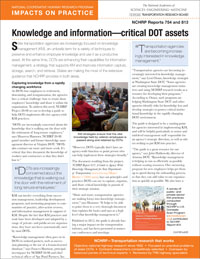 NCHRP Impacts on Practice: Knowledge and Information - Critical DOT Assets
7/14/2016 11:18:56 AM
NCHRP Impacts on Practice: Knowledge and Information - Critical DOT Assets
7/14/2016 11:18:56 AM
TRB's National Cooperative Highway Research Program (NCHRP) latest Impacts on Practice explores how guidance from two NCHRP reports have been applied by state departments of transportation to manage resources and run as efficiently as possible. Guidance on knowledge management has helped state departments of transportation train new employees as well as preserve and relay critical information from seasoned employees to the newer staff. Reports that provide knowledge management guidance include NCHRP Repo...
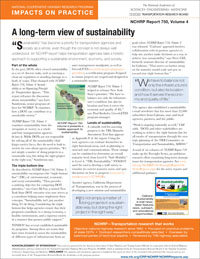 NCHRP Impacts on Practice: A Long-Term View of Sustainability
7/4/2016 11:18:56 AM
NCHRP Impacts on Practice: A Long-Term View of Sustainability
7/4/2016 11:18:56 AM
TRB's National Cooperative Highway Research Program (NCHRP) latest Impacts on Practice explores NCHRP Report 750, Volume 4 : Sustainability as an Organizing Principle for Transportation Agencies explores sustainability as a “triple bottom line” of environmental, economic, and social sustainability. The summary explores how the California Department of Transportation and New York State Department of Transportation applied the findings of Report 750, Volume 4 to reframe and better coordinate activities and...
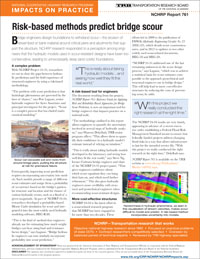 Risk-Based Methods Predict Bridge Scour
11/11/2015 12:03:29 PM
Risk-Based Methods Predict Bridge Scour
11/11/2015 12:03:29 PM
TRB’s National Cooperative Highway Research Program (NCHRP) latest Impacts on Practice explores a report that helped close the gaps between hydraulic predictions and the field experience of structural engineers by using a risk-based methodology. NCHRP Report 761 : Reference Guide for Applying Risk and Reliability-Based Approaches for Bridge Scour Prediction, is now an important tool for bridge engineers to better quantify models developed in the lab to determine practical applications.
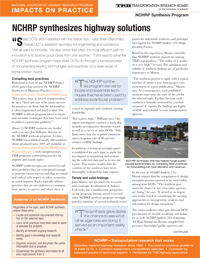 NCHRP Synthesizes Highway Solutions
10/29/2015 11:03:29 AM
NCHRP Synthesizes Highway Solutions
10/29/2015 11:03:29 AM
TRB’s National Cooperative Highway Research Program (NCHRP) latest Impacts on Practice explores how the NCHRP Synthesis Program facilitates the sharing of promising practices and techniques that can be applied by transportation practitioners and further evaluated by academia. The NCHRP program has published nearly 500 syntheses that condenses practices that are often fragmented or hard-to-find into a single publication.
 Game-Changing Ideas in Transportation Research
8/17/2015 5:20:02 PM
Game-Changing Ideas in Transportation Research
8/17/2015 5:20:02 PM
TRB’s National Cooperative Highway Research Program (NCHRP) latest Impacts on Practice explores how NCHRP’s Innovations Deserving Exploratory Analysis (IDEA) program has helped finance promising but unproven ideas in transportation engineering.
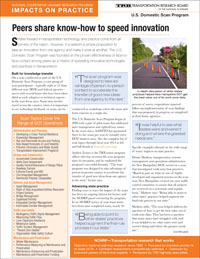 U.S. Domestic Scan
6/18/2015 11:03:29 AM
U.S. Domestic Scan
6/18/2015 11:03:29 AM
TRB’s National Cooperative Highway Research Program (NCHRP) latest Impacts on Practice explores how the NCHRP project on the U.S. Domestic Scan Program has provided state transportation agencies with the ability to share practices to accelerate the transfer of promising ideas from one agency to the next.
 NCHRP Meets DOT Executives’ Unique Needs
4/30/2012 4:34:43 PM
NCHRP Meets DOT Executives’ Unique Needs
4/30/2012 4:34:43 PM
State DOT chief executives must serve deftly and effectively in a number of roles. They are at once policymakers, the public faces of their agencies, and managers of organizations with thousands of employees. The short- and long-term challenges that CEOs face are often quite different from those of other transportation professionals.
 Advancing the Science of Highway Safety
4/30/2012 4:26:49 PM
Advancing the Science of Highway Safety
4/30/2012 4:26:49 PM
Delivering a safe transportation system is a universal goal among state DOTs. NCHRP was the driving force behind AASHTO’s Highway Safety Manual, which provides states with a modern, science-based approach to safety management, analysis, planning, and delivery.
 Better, Safer Bridges For When the Earth Shakes
4/9/2012 5:00:36 PM
Better, Safer Bridges For When the Earth Shakes
4/9/2012 5:00:36 PM
In regions across the nation, bridge engineers know that the next major seismic event is coming—maybe tomorrow, maybe centuries from now. DOTs have the critical charge of designing for earthquakes and protecting the lives of travelers.
 The Capacity Balancing Act
The Capacity Balancing Act
Highway Capacity Manual
2/7/2011 10:15:42 PM
Highway capacity: Too little means gridlock, but paving over America isn’t the answer either. The right balance involves careful policy decisions and compromise—and using the right tools to address concerns and defuse controversy.
|
|